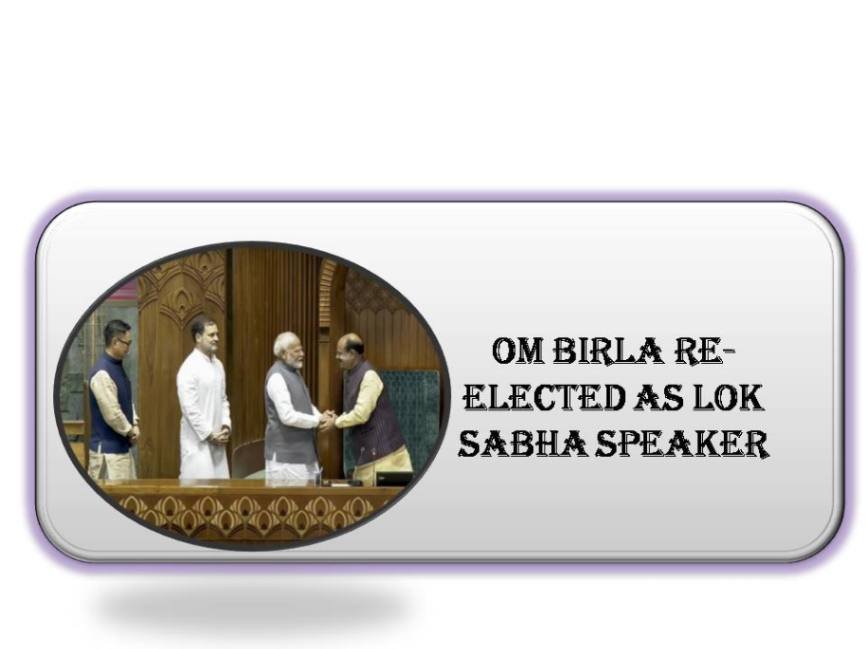Om Birla Re-elected as Lok Sabha Speaker: Om Birla, a BJP MP from Rajasthan’s Kota constituency, recently secured his re-election as the Speaker of the 18th Lok Sabha through a voice vote. This event underscores the significance of the Lok Sabha Speaker, a pivotal figure in India’s parliamentary system. This article explores the nuances of the Lok Sabha Speaker’s role, the appointment process, and the historical context of this esteemed position.
Who is the Lok Sabha Speaker?
The Lok Sabha, as India’s primary legislative body, appoints a Speaker to preside over its proceedings. The Speaker acts as both a constitutional and ceremonial head, responsible for upholding parliamentary decorum and ensuring the effective functioning of the House.
Appointment Process of the Lok Sabha Speaker
According to Article 93 of the Indian Constitution, the Lok Sabha Speaker is elected by its members through a simple majority vote. Typically, the ruling party nominates a candidate for the Speaker’s position, although occasional contested elections, like in 2024, reflect a departure from consensus-based appointments.
Responsibilities and Powers of the Lok Sabha Speaker
The Lok Sabha Speaker wields substantial authority and is tasked with interpreting constitutional provisions, maintaining order during sessions, and making critical decisions on bills and parliamentary proceedings. Their impartiality is crucial in upholding the integrity of parliamentary democracy.
Interpreter of Constitutional Provisions
The Speaker serves as the ultimate authority on constitutional interpretations within the Lok Sabha, ensuring adherence to parliamentary rules and precedents.
Presiding Over Joint Sessions
In joint sittings of both Houses of Parliament, summoned by the President to resolve legislative deadlocks, the Speaker assumes a central role in guiding discussions and maintaining parliamentary order.
Maintaining Order and Decorum
One of the Speaker’s key responsibilities is to ensure orderly conduct within the Lok Sabha, including the authority to adjourn sessions when necessary.
Casting Vote
In cases of tied votes, the Speaker holds a decisive ‘casting vote,’ influencing critical legislative outcomes.
Deciding on Money Bills
The Speaker holds exclusive authority to determine whether a proposed bill qualifies as a ‘money bill,’ a designation that significantly impacts legislative processes.
Disqualifying Members
Under the Tenth Schedule of the Indian Constitution, the Speaker adjudicates on matters of member disqualification, particularly related to defection issues.
Chairing Committees and Groups
As the ex-officio chairman of the Indian Parliamentary Group (IPG) and other key committees, the Speaker plays a pivotal role in parliamentary diplomacy and internal governance.
Constituting Committees
The Speaker oversees the formation and operation of various parliamentary committees, essential for legislative oversight and policy development.
Protecting House Privileges
Safeguarding parliamentary privileges and rights, the Speaker serves as the guardian of the Lok Sabha’s institutional integrity.
Historical Context: Evolution of the Lok Sabha Speaker
Since the inception of the Lok Sabha in 1952, the position of Speaker has evolved, reflecting changes in India’s political landscape and parliamentary practices.
The role of the Lok Sabha Speaker remains central to India’s democratic framework, ensuring the effective functioning of parliamentary processes and upholding the principles of constitutional governance. Om Birla’s re-election underscores the importance of this office in fostering legislative consensus and democratic stability.
Frequently asked questions
Who is the current Speaker of the Lok Sabha?
the current Speaker of the Lok Sabha is Om Birla. He was re-elected to this position for a second consecutive term in 2024.
What is the role of the Lok Sabha Speaker?
The Lok Sabha Speaker serves as the presiding officer of the Lower House of Parliament in India. They are responsible for maintaining order during sessions, interpreting parliamentary rules and precedents, and ensuring the House operates smoothly and efficiently.
How is the Lok Sabha Speaker appointed?
The Lok Sabha Speaker is elected by its members through a voting process. Generally, the ruling party nominates a candidate who is then elected by a simple majority vote in the Lok Sabha. The appointment is overseen by the Pro-tem Speaker, appointed by the President of India.
How long does the Lok Sabha Speaker serve?
The Lok Sabha Speaker serves a term of five years, or until the dissolution of the Lok Sabha, whichever is earlier. They can be re-elected if they continue to hold the confidence of the majority of members.

























